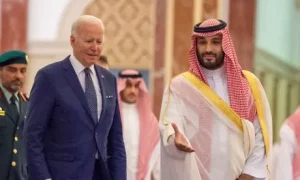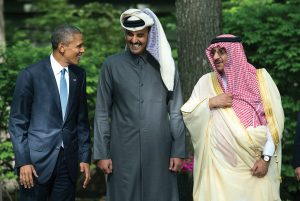Saudi Arabia is no longer the best friend of the US?
Gulf states have begun to distance themselves from the US government. Saudi Arabia and the UAE did not support the US in the sanctions fight against Russia and refused to participate in the “fuel wars”. Moreover, in Riyadh they refuse to answer calls from the White House and simply ignore their main ally. A number of Arab media believe that the current crisis could lead to a complete rupture between longtime partners.
ARTEMY SHARAPOV, April 25, 2022, 17:02 — REGNUM The Ukrainian crisis and the wave of sanctions against Russia that followed it showed well who is who in modern geopolitics. If the countries of Europe unanimously support the United States, making different decisions that harm their own interests.
then the Arab powers have shown more pragmatism. A number of countries, primarily the UAE and Saudi Arabia, distanced themselves from Washington, and their leadership spoke in favor of further cooperation with Russia.
In early March, the media reported that Saudi Crown Prince Mohammed bin Salman was not returning calls from Washington. Presumably, the US authorities wanted to ask their partners to increase oil production in order to neutralize the negative effect of anti-Russian sanctions.
Subsequently, the prince gave an interview to The Atlantic in which he stated that he did not care about Biden’s opinion. When asked by the publication “Are you afraid that Biden misunderstood you,” Mohammed bin Salman replied: “I just don’t care. Biden should think not about me, but about the interests of America.”

For many who are unfamiliar with the peculiarities of the Middle East policy, the statement of the Saudi prince came as a complete surprise, since Riyadh is traditionally considered Washington’s main ally in the region. However, in reality, the crisis between Washington and Saudi Arabia began much earlier – with the coming to power in the United States of Joe Biden.
If the previous US government forced relations with the Persian Gulf countries, actively supporting them in the fight against Iran, then the current US administration is not in favor of the current Saudi authorities. Riyadh is blamed for political repression and human rights violations both in Saudi Arabia itself and in neighboring countries.
In September 2021, a meeting was held between Prince Mohammed bin Salman and National Security Adviser to the US President Jake Sullivan. According to the American press, the meeting was held in a raised voice, and the prince even allowed himself to raise his voice to an American official when he raised the issue of the murder of Saudi opposition journalist Jamal Kasogi.
Moreover, Saudi Arabia’s official television aired a satirical episode that openly ridiculed the US president, an unprecedented case in the history of diplomatic relations between the two countries. Adding fuel to the fire are Washington’s demands to release former Crown Prince Mohammed bin Naïf and the King’s brother Ahmed bin Abdelaziz, which the Saudi authorities consider interference in the country’s internal affairs.

In the American press, relations between the two countries are characterized as “reaching the bottom.” However, experts cannot yet suggest how the United States should behave in such a situation. Some say the White House needs to put the presumptuous partner in his place, while others believe that such actions will only push the Saudis into the arms of China and Russia.
Discontent in Riyadh is also caused by other actions of the American administration. Since Biden came to power, the United States stopped (at least officially) from transferring weapons to the allies for the war in Yemen. The Pentagon then decided to withdraw American Patriot anti-aircraft missile systems from Saudi territory, leaving the Saudis vulnerable to missile attacks from Yemen’s Houthi rebels. Another fly in the ointment in the barrel of US-Saudi relations is the talks between the US and Iran on the “Iranian nuclear deal”.
In the current situation, Saudi Arabia is still in a stronger position. The authorities of the kingdom can afford to play with world oil prices, thereby putting pressure on the West. Therefore, one should not be surprised if, in the foreseeable future.
“moderate opposition” appears in Saudi Arabia or Washington decides to look for oil or democracy in the region. In Riyadh, most likely, they realize that such a scenario for the development of events is quite likely, therefore they are looking for new partners, groping for new channels for cooperation with the SCO countries.